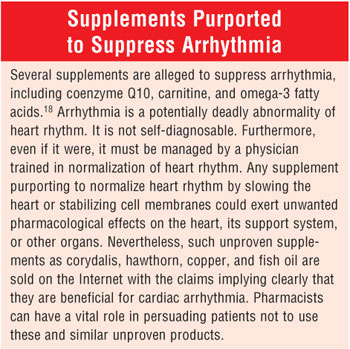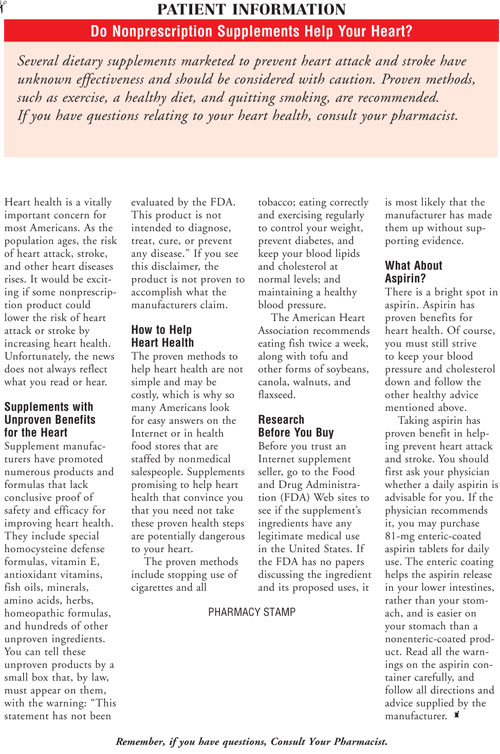US
Pharm. 2006;2:12-15.
Prior to the 1994 Dietary
Supplement Health and Education Act (DSHEA), the number of products promising
to augment cardiac health was not great. However, that legislation allowed
companies to make ill-supported and vague claims for products whose safety and
efficacy were unproven. Consumers now face an onslaught of products that claim
to "support and preserve" male urinary function, female menopause, liver
activity, and a healthy heart. Yet, dietary supplements can actually present
clear dangers to the heart. This column explores some of the most hyped
supplements and their purported cardiac benefits or proven dangers.
Omega-3 Fatty Acids
Claims that fish
oils can improve cardiovascular health first surfaced several decades ago. In
1993, the FDA reviewed the proof of benefit for omega-3 fatty acids,
indicating that evidence was lacking for the risk reduction of coronary heart
disease (CHD).1
However, the agency continued
to examine evidence for two fatty acids: eicosapentaenoic acid (EPA) and
docosahexaenoic acid (DHA). In 2000, the FDA stated that intervention trials
suggested that omega-3 fatty acids reduced the risk of CHD. The FDA concluded
that the use of EPA and DHA omega-3 fatty acids as dietary supplements was
safe and lawful, providing that intake not exceed 3 g daily from both food and
supplement sources. Thus, doses of 2 g daily of EPA and DHA would be advised.
The agency decided that the following health claim would be appropriate: "The
scientific evidence about whether omega-3 fatty acids may reduce the risk of
coronary heart disease (CHD) is suggestive, but not conclusive. Studies in the
general population have looked at diets containing fish and it is not known
whether diets or omega-3 fatty acids in fish may have a possible effect on a
reduced risk of CHD. It is not known what effect omega-3 fatty acids may or
may not have on risk of CHD in the general population."1
The FDA issued a similar
finding in 2004 for conventional foods containing EPA and DHA.2
Specific benefits provided by DHA and EPA may include reduced risk of
arrhythmias, lower serum triglyceride levels, and inhibition of platelet
function.3 The American Heart Association (AHA) now recommends that
people eat fish twice weekly and also consume tofu and other soybean products,
as well as canola, walnuts, and flaxseed and their oils.4,5 The AHA
advises that patients consult a physician to see whether EPA/DHA supplements
might be helpful if they cannot obtain sufficient omega-3 fatty acids by
dietary means alone. Finally, the AHA recommends that those with elevated
triglycerides take 2 to 4 g daily of EPA/DHA in capsule form, with monitoring
by a physician. Thus, while evidence is not yet conclusive, the suggestive
nature of research to date could allow the pharmacist to justifiably recommend
adherence to the AHA guidelines with regard to dietary changes and possible
ingestion of EPA/DHA supplements.

Homocysteine Reduction
Since 1969,
homocysteine has been proposed as a causal agent for vascular disease.6
As a result, various groups have promoted the consumption of folic acid,
pyridoxine, and cyanocobalamin to lower the risk of vascular disease. This mix
of vitamins is claimed to lower homocysteine levels. In 1999, the FDA
evaluated data for and against this claim.7 Evidence showed that
folic acid and, to a lesser extent, cyanocobalamin and pyridoxine, did lower
homocysteine. Yet, at that time, there were insufficient data to prove any
link between elevated homocysteine levels and increased risk of vascular
disease. The agency was therefore unwilling to allow any claims about B
vitamins and cardiovascular risk in 1999.
Shortly thereafter, the FDA
initiated a new review of over 35 more recent studies. Suggestive (not
conclusive) evidence indicated that elevated homocysteine levels are
associated with the risk of vascular disease, based on prospective,
case-control, and cross-sectional research. This research did not answer
whether some other unidentified variable affects both and thus could not
conclusively confirm whether lowering homocysteine would reduce the risk of
vascular disease.
Due to the limitations of
existing data, the FDA allowed a qualified health claim for folic acid,
pyridoxine, and cyanocobalamin: "It is known that diets low in saturated fat
and cholesterol may reduce the risk of heart disease. The scientific evidence
about whether folic acid, vitamin B 6 and vitamin B12
may also reduce the risk of heart disease and other vascular diseases is
suggestive, but not conclusive. Studies in the general population have
generally found that these vitamins may lower homocysteine, an amino acid
found in the blood. It is not known whether elevated levels of homocysteine
may cause vascular disease or whether high homocysteine levels are caused by
other factors. Studies that will directly evaluate whether reducing
homocysteine may also reduce the risk of vascular disease are not yet
complete." 7
While some sources recommend
400 mcg of folic acid, 3 mg of pyridoxine, and 5 mcg of cyanocobalamin, the
FDA concluded that available information could not identify any specific
amounts of the vitamins needed to lower homocysteine. This calls into question
some supplements labeled as "homocysteine formulas" that contain megadoses of
the three vitamins (e.g., 800 mcg of folic acid, 50 mg of pyridoxine, and 100
mcg of cyanocobalamin). This is critical regarding pyridoxine, since overdoses
can cause irreversible peripheral neuro pathy.
Vitamin E
In 1999, the FDA
was petitioned to authorize a health claim about the use of vitamin E in
reducing the risk of heart disease. In 2001, the agency issued a letter
detailing its findings.8 A review of interventional and
observational studies failed to uncover a relationship between vitamin E and
reduced risk of cardiovascular disease. The FDA concluded that a qualified
claim could not be allowed. Thus, pharmacists should not recommend vitamin E
to reduce the risk of any heart-related pathology.
Antioxidant Vitamins
Antioxidant vitamins, such as
vitamin E, ascorbic acid, and beta-carotene, are allegedly beneficial in
preventing cardiovascular disease.9 This claim began in the 1930s,
when patients on a conventional diet were found to have higher blood pressure
than were patients on diets rich in ascorbic acid and tocopherol.10
Subsequent research seemed to confirm the benefit of antioxidants in lowering
the risk of myocardial infarction (MI) and stroke. Investigators conducted a
thorough Medline search of reputable research on any link between antioxidants
and cardiovascular diseases.10 They reached the following
conclusions:
(1) While patients with ischemic heart
disease and stroke often have low intake and/or plasma levels of antioxidant
vitamins, the disease and suboptimal vitamin levels may be reflective of
unfavorable lifestyle choices.
(2) Those taking high amounts of
antioxidants have been shown to have a low risk of MI and stroke, but both may
be part of a cluster of healthy behaviors, rather than being linked in a
cause-effect relationship.
(3) Food supplements high in
antioxidants have not exerted beneficial effects on the risk of MI or stroke
in randomized clinical trials.
(4) Observational studies suggest
that diets low in fruits and vegetables may elevate the risk of cardiovascular
disease, but other benefits of a diet high in fruits and vegetables are
sufficient for its recommendation. This conclusion did not suggest that
patients should ingest antioxidant supplements in preference to the healthful
diet recommended by researchers.
Antioxidant supplementation is
not yet proven to affect cardiovascular disease and may, in fact, be harmful.
Beta-carotene can raise the risk of lung cancer in males who smoke.11
Ephedra/Ephedrine
Ephedra is critical
to include in any discussion of the effects of supplements on the heart, due
to the danger it represents. In 2003, the AHA urged the FDA to remove
nonprescription ephedra-containing dietary supplements from the market, citing
high blood pressure, stroke, heart attack, and death.12 In February
2004, the FDA issued a regulation prohibiting these dietary supplements,
advising consumers to immediately stop using them.13 The rule
became effective on April 6, 2004. The FDA was given authority to act against
ephedra under the auspices of the DSHEA.
Nevertheless, supplement
makers Nutraceutical Corporation and Solray, Inc., of Park City, Utah,
initiated a lawsuit against the ban.14-16 As a result, U.S.
District Court Judge Tena Campbell unfortunately lifted the ban in April 2005,
enabling sales of the dangerous supplement once again. The basis for lifting
the ban was that the FDA had not adequately demonstrated dangers with smaller
doses of ephedra. Of course, the problem with this ruling is that patients who
wish to take the supplement for diet or athletic misuse will not stop at
taking one tablet of a lower dose but will take enough tablets to equal the
larger dose they once took. Some health food stores in malls now have posted
signs stating, "We have ephedra!" The unique dangers of this supplement are so
compelling that pharmacists should not stock or sell ephedra, Ma huang, or
ephedrine-containing products.
Conclusion
Pharmacists should
be cautious about recommending supplements for cardiac and vascular health.
Relying on these therapies might cause patients to neglect other critical and
proven methods to prevent coronary artery disease, such as smoking cessation,
blood pressure monitoring, lowering of lipid levels, and prevention and
treatment of diabetes.17

REFERENCES
1. Lewis CJ. Letter
regarding dietary supplement health claim for omega-3 fatty acids and coronary
heart disease. Available at: cfsan.fda.gov/~dms/ds-ltr11.html. Accessed
December 19, 2005.
2. FDA announces
qualified health claims for omega-3 fatty acids. FDA News. September 8, 2004.
Available at: fda.gov/bbs/topics/news/2004/NEW01115.html. Accessed December
19, 2005.
3. Harris WS. Fish oil
supplementation: evidence for health benefits. Cleve Clin J Med.
2004;71:208-210, 212, 215-218, 220-221.
4. American Heart
Association. Fish and omega-3 fatty acids. Available at:
americanheart.org/presenter.jhtml?identifier=4632. Accessed December 19, 2005.
5. Kris-Etherton PM,
Harris WS, Appel LJ. Omega-3 fatty acids and cardiovascular disease: new
recommendations from the American Heart Association. Arterioscler Thromb
Vasc Biol. 2003;23:151-152.
6. Tice JA, Ross E,
Coxson PG, et al. Cost-effectiveness of vitamin therapy to lower plasma
homocysteine levels for the prevention of coronary heart disease: effect of
grain fortification and beyond. JAMA. 2001;286:936-943.
7. Lewis CJ. Letter
regarding dietary supplement health claim for folic acid, vitamin B6, and
vitamin B12 and vascular disease. Available at: cfsan.fda.gov/
~dms/ds-ltr12.html. Accessed December 12, 2005.
8. Lewis CJ. Letter
regarding dietary supplement health claim for vitamin E and heart disease.
Available at: cfsan.fda.gov/~dms/ds-ltr16.html. Accessed December 19, 2005.
9. Tran TL. Antioxidant
supplements to prevent heart disease: real hope or empty hype? Postgrad Med
. 2001;109:109-114.
10. Asplund K.
Antioxidant vitamins in the prevention of cardiovascular disease: a systematic
review. J Intern Med. 2002;251:372-392.
11. Antioxidant
supplements: bad news and good news. Harv Mens Health Watch .
2003;7:1-5.
12. American Heart
Association. American Heart Association urges ban of popular dietary
supplements. Available at: americanheart.org/presenter.jhtml?
identifier=3010678. Accessed December 19, 2005.
13. FDA issues
regulation prohibiting sale of dietary supplements containing ephedrine
alkaloids and reiterates its advice that consumers stop using these products.
FDA News. Feb. 6, 2004. Available at: cfsan.fda.gov/~lrd/fpephed6.html.
Accessed December 19, 2005.
14. Ephedra ban lifted
by U.S. judge: FDA says it's evaluating the ruling before deciding whether to
appeal. HealthDay News. April 14, 2005. Available at:
healthfinder.gov/news/newsstory.asp?docid=525167. Accessed December 19, 2005.
15. Ephedra court
ruling rekindles debate. HealthDay News. April 15, 2005. Available at:
4woman.gov/news/english/525181.htm. Accessed December 19, 2005.
16. Ephedra (Ephedra
sinica)/ Ma huang. Available at: nlm.nih.gov/medlineplus/
druginfo/natural/patient-ephedra.html. Accessed December 19, 2005.
17. Taylor BV, Oudit
GY, Evans M. Homocysteine, vitamins, and coronary artery disease:
comprehensive review of the literature. Can Fam Physician.
2000;46:2236-2245.
18. Chung MK. Vitamins,
supplements, herbal medicines, and arrhythmias. Cardiol Rev.
2004;12:73-84.
To comment on this article,
contact
editor@uspharmacist.com.






